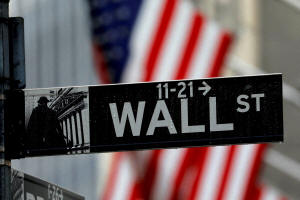S&P 500 ends near flat as energy, defensive sectors counter megacap
declines
 Send a link to a friend
Send a link to a friend
 [August 19, 2023] By
Saeed Azhar and Amruta Khandekar [August 19, 2023] By
Saeed Azhar and Amruta Khandekar
NEW YORK (Reuters) - The S&P 500 ended nearly flat on Friday as gains in
defensive sectors and energy offset weakness in megacap growth stocks,
while investors looked toward next week's speech by Federal Reserve
Chair Jerome Powell.
Megacap technology-related growth stocks dipped, with Alphabet down 1.9%
and Tesla falling 1.7%, as investors fretted that interest rates could
stay higher for longer.
The tech-heavy Nasdaq posted the biggest weekly decline of the three
major indices, losing 2.6%.
With no major catalysts driving markets, focus has shifted to Powell's
speech at the Jackson Hole economic symposium next Friday for clues on
the interest rate outlook as well as earnings from chip designer Nvidia
on Wednesday.
The S&P 500 lost 0.65 points, or 0.01%, to 4,369.71 and the Nasdaq
Composite dropped 26.16 points, or 0.2%, to 13,290.78.
The Dow Jones Industrial Average rose 25.83 points, or 0.07%, to
34,500.66 points.
The CBOE volatility index hit its highest in nearly three months,
reflecting rising investor anxiety.

Nvidia's shares fell 0.1%, but still notched a weekly gain. Nvidia has
had a spectacular rally on expected growth in artificial intelligence,
nearly tripling in value year to date.
Defensive sectors such as consumer staples and utilities rose, with
gains in firms such as retailer Walmart helping the Dow Jones Industrial
Average.
The S&P 500 energy index rose 0.9%, with Exxon Mobil among leading
gainers, up 1.5%.
Among major movers of the day, Estee Lauder tumbled 3.3% after the
cosmetics maker forecast its annual net sales and profit below Street
estimates.
The Nasdaq has fallen 7.2% in the past three weeks, its deepest
three-week drop since late December. The S&P 500's three-week loss of
4.6% is its biggest such decline since the three weeks ending on March
10.
This week's losses came after a spate of strong economic data caused
investors to dial back expectations of rate cuts and drove up government
bond yields.
[to top of second column] |

Raindrops hang on a sign for Wall Street
outside the New York Stock Exchange in Manhattan in New York City,
New York, U.S., October 26, 2020. REUTERS/Mike Segar

"We've long been overdue for a correction in equities, and it's
clear that higher rates have now become the catalyst for that," said
Michael Reynolds, vice president investment strategy
at investment and wealth advisory firm Glenmede.
"When the opportunity cost for capital becomes more competitive,
valuations should correct on risk bearing assets, especially large
cap equities which have been trading at significant premiums this
year."
Benchmark 10-year U.S. Treasury yields dropped from 10-month highs
after they approached - but failed to break through - levels that
would have been the highest since 2007 on Thursday.
Traders see a nearly 91% chance of the Fed holding rates at current
levels at its September meeting, according to the CME Group's
FedWatch tool.
Hawaiian Electric shares surged 14% after the utility firm said its
goal was not to restructure the company.
Shares of cryptocurrency firm Coinbase Global fell 3% and Riot
Platform tumbled nearly 5.5% as bitcoin hit a two-month low.
Volume on U.S. exchanges was relatively light, with 10.6 billion
shares traded, compared to an average of 11.0 billion shares over
the previous 20 sessions.
Advancing issues outnumbered falling ones within the S&P 500 by a
1.5-to-one ratio.
The S&P 500 posted no new highs and 17 new lows; the Nasdaq recorded
24 new highs and 225 new lows.

(Reporting by Amruta Khandekar and Shristi Achar A in Bengaluru and
Saeed Azhar in New York; Editing by Maju Samuel and David Gregorio)
[© 2023 Thomson Reuters. All rights
reserved.]
This material may not be published,
broadcast, rewritten or redistributed.
Thompson Reuters is solely responsible for this content. |